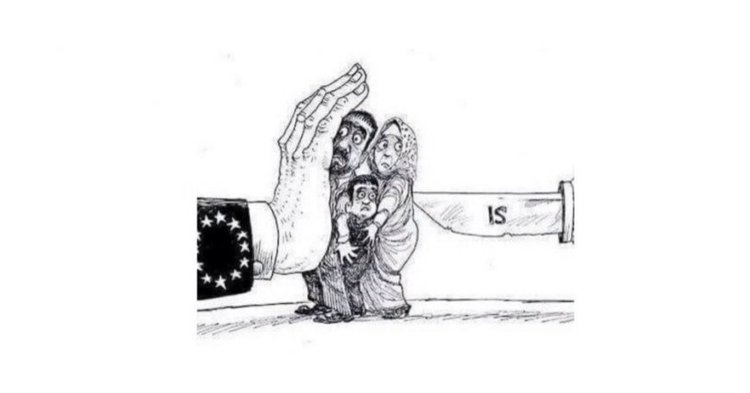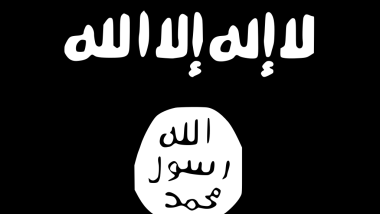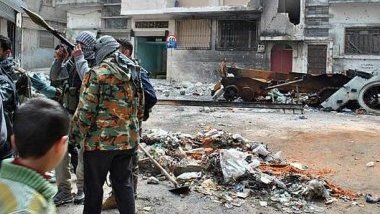In France, Germany and Poland, conservative politicians and national parties from the far-right have already started to criminalise the more than 800 thousand immigrants and asylum seekers that have entered the European Union in 2015. Interviews over the weekend confirmed that Islamic Jihad soldiers could have infiltrated into groups of refugees in order to reach the rich northern European countries and carry out the attacks.
Marine Le Pen, leader of the Front National (National Front) said, “France should immediately abandon the Schengen Agreement” which keeps the borders open between 26 European countries. Markus Soder, leader of the hardliners of the German Christian Democrat Party, wrote on his Twitter account that “the attacks will change everything and we (Germany) cannot permit more illegal and uncontrolled immigration in our territory”. In Poland, a country that has turned more reactionary, the leader of the ultra-conservative party Law and Justice (that came to power after the elections in October), Konrad Szymanski, said “Europe needs to seriously revisit its policy of taking in refugees”. He also announced that his country would not be taking in any new asylum seekers.
Once again the countries of the “West” are not recognising their role in the formation of extremist groups. Many of the perpetrators of the attacks are sons of immigrants from Arab countries that settled in Europe to start new lives. In other words, they are European citizens. The problem is that for a number of decades the Muslim world has been rejected by the West and has been portrayed as a threat to Christian values, democracy and liberty. This West believes in the narrative of the “clash of civilisations” in which these two groups cannot co-exist. Therefore, when these two groups move around in the same space, they do so in the context of a ‘hidden apartheid’.
France has the highest Muslim population in the EU, with more than six million people living mostly in ghettos far away from the urban centres. To integrate into French society and its values, these individuals had to adapt to a forced assimilation of customs, such as the prohibition of the headscarf for women in public spaces. Social peace between the dominant group (French society) and the foreigners has never been consolidated.
Analysis and reports carried out by intellectuals and specialist journalists in the field such as Noam Chomsky and Patrick Cockburn (author of the best-selling book about the rise of ISIS), show that young Muslims living in Europe and the United States who suffer from daily humiliation in a society they consider has decadent values, find in Islamic jihadism a way of giving meaning to their lives. ISIS’ greatest force is not its arms, but its seductive discourse, succeeding in attracting more and more minds to the extremist cause: putting an end to the West and extending the domains of the caliphate.
Killing helpless civilians in the name of a sacred war is an outrageous and abominable idea. But fanaticism (that being the Islamic ideology that lies behind ISIS’ atrocities), is not best combatted with bombs. The more we continue to close our eyes to the injustices faced by Muslims, the more of a reason the fanatics will have to hate their enemies and plan further attacks. The war in Syria has been developing for over four years and none of the world powers has taken measures to end the conflict and suffering of the local population (except for, it is true, financing the different groups that are fighting over power). The refugee crisis and the expansion of terrorism across the world are the most symbolic effects of this lack of action.
The possibility (ever-decreasing, according to investigations), that one of the attackers in Paris entered Europe as a refugee with a Syrian passport, should also not become a pretext for raising the hate discourse against asylum seekers. According to the United Nations High Commissioner for Refugees (UNHCR) and the International Organisation for Migration (IOM), there is no proof that the terrorists arrived hidden amongst the mass of refugees. It is vital that rationality prevails over possible feelings of revenge, and the press and European political institutions should act to prevent widespread public outrage.
Men, women and many children are leaving everything behind to risk their lives at sea and by land to look for a better life in Europe. It is inconceivable and inhumane to imagine that these families are a threat to the security of the European bloc. Closing borders will not prevent their arrival, instead it will make their journey more dangerous.
Do not blame refugees for the attacks in Paris. In their countries of origin, they are victims of political, social and cultural persecution. Many that arrive in Europe are the survivors of genocides perpetrated by armed militias. They are victims of terrorism just like European citizens and Christians. And they come in peace, to contribute to the development and the well-being of the country that gives them refuge.
Europe is living through a key moment in its history as an economic and political bloc, in which it has to show whether it will honour the ideals of liberty, equality and fraternity, the fundamental principles and basis of modern democracy which arose in the 18th century. Or whether, on the contrary, it will have a mark in its history as a “feudalised” continent, focused on its own interests and with a small privileged population safeguarding itself from the problems of the world.






Follow the comments: |
|
